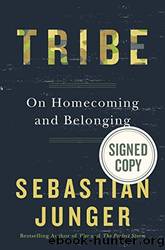Tribe: On Homecoming and Belonging by Junger Sebastian

Author:Junger, Sebastian [Junger, Sebastian]
Language: eng
Format: epub
Tags: Social Science / Violence In Society, Politics, Sociology, War, Psychology, History, Philosophy, History / Military / Iraq War (2003-2011), History / Military / Afghan War (2001-)
Amazon: B01BCJDSNI
Goodreads: 40940205
Publisher: Twelve
Published: 2016-06-21T07:00:00+00:00
Any discussion of veterans and their common experience of alienation must address the fact that so many soldiers find themselves missing the war after itâs over. That troubling fact can be found in written accounts from war after war, country after country, century after century. As awkward as it is to say, part of the trauma of war seems to be giving it up. âFor the first time in [our] lives⦠we were in a tribal sort of situation where we could help each other without fear,â a former gunner in the 62nd Coast Artillery named Win Stracke told oral historian Studs Terkel for his book The Good War. (Stracke was also a well-known folk singer and labor organizer who was blacklisted during the McCarthy era for his political activity.) âThere were fifteen men to a gun. You had fifteen guys who for the first time in their lives were not living in a competitive society. We had no hopes of becoming officers. I liked that feeling very much⦠It was the absence of competition and boundaries and all those phony standards that created the thing I loved about the Army.â
Adversity often leads people to depend more on one another, and that closeness can produce a kind of nostalgia for the hard times that even civilians are susceptible to. After World War II, many Londoners claimed to miss the exciting and perilous days of the Blitz (âI wouldnât mind having an evening like it, say, once a weekâordinarily thereâs no excitement,â one man commented to Mass-Observation about the air raids), and the war that is missed doesnât even have to be a shooting war: âI am a survivor of the AIDS epidemic,â an American man wrote in 2014 on the comment board of an online lecture about war. âNow that AIDS is no longer a death sentence, I must admit that I miss those days of extreme brotherhood⦠which led to deep emotions and understandings that are above anything I have felt since the plague years.â
What people miss presumably isnât danger or loss but the unity that these things often engender. There are obvious stresses on a person in a group, but there may be even greater stresses on a person in isolation, so during disasters there is a net gain in well-being. Most primates, including humans, are intensely social, and there are very few instances of lone primates surviving in the wild. A modern soldier returning from combatâor a survivor of Sarajevoâgoes from the kind of close-knit group that humans evolved for, back into a society where most people work outside the home, children are educated by strangers, families are isolated from wider communities, and personal gain almost completely eclipses collective good. Even if he or she is part of a family, that is not the same as belonging to a group that shares resources and experiences almost everything collectively. Whatever the technological advances of modern societyâand theyâre nearly miraculousâthe individualized lifestyles that those technologies spawn seem to be deeply brutalizing to the human spirit.
Download
This site does not store any files on its server. We only index and link to content provided by other sites. Please contact the content providers to delete copyright contents if any and email us, we'll remove relevant links or contents immediately.
The Radium Girls by Kate Moore(12013)
100 Deadly Skills by Clint Emerson(4914)
Rise and Kill First by Ronen Bergman(4776)
The Templars by Dan Jones(4681)
The Doomsday Machine by Daniel Ellsberg(4482)
The Rape of Nanking by Iris Chang(4200)
Killing England by Bill O'Reilly(3994)
Stalin by Stephen Kotkin(3956)
Hitler in Los Angeles by Steven J. Ross(3937)
12 Strong by Doug Stanton(3541)
Hitler's Monsters by Eric Kurlander(3327)
Blood and Sand by Alex Von Tunzelmann(3192)
The Code Book by Simon Singh(3175)
Darkest Hour by Anthony McCarten(3117)
The Art of War Visualized by Jessica Hagy(3000)
Hitler's Flying Saucers: A Guide to German Flying Discs of the Second World War by Stevens Henry(2744)
Babylon's Ark by Lawrence Anthony(2671)
The Second World Wars by Victor Davis Hanson(2521)
Tobruk by Peter Fitzsimons(2503)
